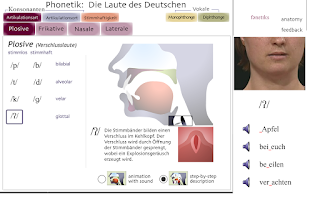For this purpose I also used the Iowa website. It has not only the descriptions of the articulatory steps for specific sounds, but also gives several examples.
At first, as I was saying in the previous post, they sounded very similar to me. Later, I've started differentiating subtle difference between them.
Glottal [h] is a very short sound. It is used similarly to the English counterpart.
Velar [x] can appear only at the end of the word, or in the middle of the word after back vowel sounds [ɔ] and [u], which makes sense because it eases the tongue movement.
In contrast, palatal [Ç] sounds a lot softer, and serves as an elsewhere case for [x]. Those two sounds are in complementary distribution. During the production of this sound the lips as if are stretching in a smile.
The glottal stop, as I have just discovered, is more common in German than in American English. It is widely used in the middle of the word between the prefix (both separable and inseparable) and a word root.
Here is my recording from this week.




In the German consonant chart I did not find the sound [w]. I wonder if it exists in German. This is what I will explore next week.
Also, I want to take a closer look at the German pronunciation of the English words.
No comments:
Post a Comment